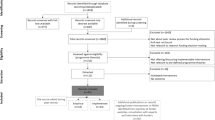Abstract
This article addresses the potential effectiveness of blind review in selecting and funding research proposals in a “scientifically small” country. By analyzing 474 responses of the blinded reviewers ever worked for Korea Science and Engineering Fund, it was found that blind review is fairly effective. About two thirds of the blinded reviewers were unable to recognize the applicants accurately. The applicant detection was affected by (1) physical age, (2) professional experience, and (3) geographical location of doctoral education of the applicant, (4) review experience, (5) rank of employing universities of the reviewers, and (6) similirity of research interest between an applicant and a reviewer. It was also found that blind review was more strongly advocated by those who had made a wrong guess or who had given up guessing. Implications of the findings and future research directions were discussed.
Similar content being viewed by others
References
Bakanic, V., C. McPhail, R. J. Simon, (1987) The manuscript review and decision-making process,American Sociological Review, 52:631.
Bozeman, B. (1993) Peer review and evaluations of R&D impacts, inEvaluating R&D Impacts: Methods and Practice (Eds.) byB. Bozeman, J. Melker, Kluwer Academic Publisher, 79–98, Norwell, Massachusetts, USA.
Ceci, S. J., D. Peters, (1984) How blind is blind review,American Psychologist, 39:1491.
Chubin, D. E., E. J. Hackett, (1990)Peerless Science: Peer Review and U.S. Science Policy, Albany, State University of New York Press.
Chubin, D. E., S. Jasanoff, (1985) Peer review and public policy,Science, Technology and Human Values, 10:3.
Chungangilbosa, (1996),97 ranking of the universities in Korea, Chungagilbosa.
Cicchetti, D. V. (1980) Reliability of reviewers for the American psychologist: A biostatistical assessment of the data.American Psychologist, 35:300.
Cole, S., J. R. Cole, G. A. Simon, (1981) Chance and consensus in peer review,Science, 214:881.
Gillespie, G. W., D. E. Chubin, G. M. Kurzon, (1985) Experience with NIH peer review: Researchers' cynicism and desire for change,Science, Technology and Human Values, 10:44.
Gustafson, T. (1975) The controversy over peer review: Recent studies of the peer review system show that its critics have yet to make their case.Science, 190:1060.
Hargens, L. L. (1988) Scholarly consensus and journal rejection rates,American Sociological Review, 53:139.
Hartmann, I., F. Neidhard, (1990) Peer review at the Deutsche Forschungsgemeinschaft,Scientometrics, 19:419.
Jasanoff, S. (1985) Peer review of the regulatory process,Science, Techology and Human Values, 10:20.
Kalberer, J. T. (1985) Peer review and the consensus development process.Science, Technology and Human Values, 10:63.
Koshland, D. E. (1985) Peer review of peer review.Science, 228:1387.
Lee, M., B. Son, K. Om, (1996) Evaluation of national R&D projects in Korea,Research Policy, 25:805.
Lindsey, D. (1988) Assessing precision in the manuscript review process: A little better than a dice roll,Scientometrics, 14:75.
Maddox, J. (1984) Privacy and the peer-review system,Nature, 312:497.
Merton, R. K., H. Zuckerman, (1973) Institutionalized patterns of evaluation in science, inThe Sociology of Science, byR. K. Merton, Chicago, IL: University of Chicago Press, 460–496.
Peters, D. P., S. J. Ceci, (1982) Peer review practices of psychological journal: The fate of published articles, submitted again.Behavioral and Brain Sciences, 5:187.
Porter, A., F. Rossini, (1985) Peer review of interdisciplinary proposals,Science, Technology and Human Values, 10:34.
Rosenblatt, A., S. A. Kirk, (1980) Recognitions of authors in blind review of manuscripts.Journal of Social Service Research, 3:383.
Roy, R. (1984) Alternative to review by peers: A contribution to the theory of scientific choice.Minerva, 22:316.
Roy, R. (1985) Funding science: The real defects of peer review and an alternative to it,Science, Technology and Human Values, 10:47.
Author information
Authors and Affiliations
Rights and permissions
About this article
Cite this article
Lee, M., Om, K. & Koh, J. Blind review of research proposals in Korea: Its effectiveness and factors affecting applicant detection. Scientometrics 45, 17–31 (1999). https://doi.org/10.1007/BF02458466
Received:
Issue Date:
DOI: https://doi.org/10.1007/BF02458466




